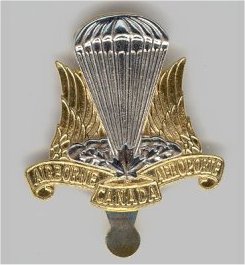Harper on Defence: Return of the Canadian Airborne Regiment?
This morning, Stephen Harper announced his campaign promises on national defence. It's no surprise that he plans on boosting defence spending: the Tories have been complaining for years that Canada's been neglecting her Armed Forces. The specifics, however, bear some examination.
First, Harper wants to spend on strategic and tactical airlift capability. No real argument there: he can point to this Fraser Institute report to make his case that we need it.
Second, Harper wants to double the size of DART. It's immediate good optics, since DART's had some good publicity in the past year. But he might want to couple that with an announcement on disaster relief protocols. Hurricane Katrina and New Orleans (and to a lesser extent, Kaschechewan) showed what can happen when different levels of government don't talk to each other in the face of a disaster. Announcing a multilevel meeting to thrash out Canada's emergency-response plans would go a long way towards establishing Tory credibility on being able to handle the unexpected.
But it's the third component that might raise some eyebrows:
Creation of a 650 strong airborne battalion, to be stationed at CFB Trenton, available for rapid or difficult deployments for emergency, humanitarian, or military operations.This, in other words, is tantamount to reviving the Canadian Airborne Regiment.
 Ten years ago, the Chrétien government disbanded the Regiment over allegations its members had committed abuses during a peacekeeping mission. The circumstances of that decision have been recorded elsewhere, but suffice to say that the Tories have always regarded the Regiment's disbanding as a mistake, a political decision made merely to get Liberal neglect of the Armed Forces out of the spotlight.
Ten years ago, the Chrétien government disbanded the Regiment over allegations its members had committed abuses during a peacekeeping mission. The circumstances of that decision have been recorded elsewhere, but suffice to say that the Tories have always regarded the Regiment's disbanding as a mistake, a political decision made merely to get Liberal neglect of the Armed Forces out of the spotlight.Could this new regiment cause another Somalia to happen? Obviously not; the Canadian Forces have learned from Somalia. And there's no question that, if Canada wants to be a major player in the peacekeeping game again, we need the capability that Harper's promising.
This won't necessarily resonate as much in Canada as it would in the States; the Canadian mainstream is a bit more indifferent when it comes to defence matters. But in terms of capturing the votes of the Armed Forces, let's just say Stephen Harper's managed a good head start.





<< Home